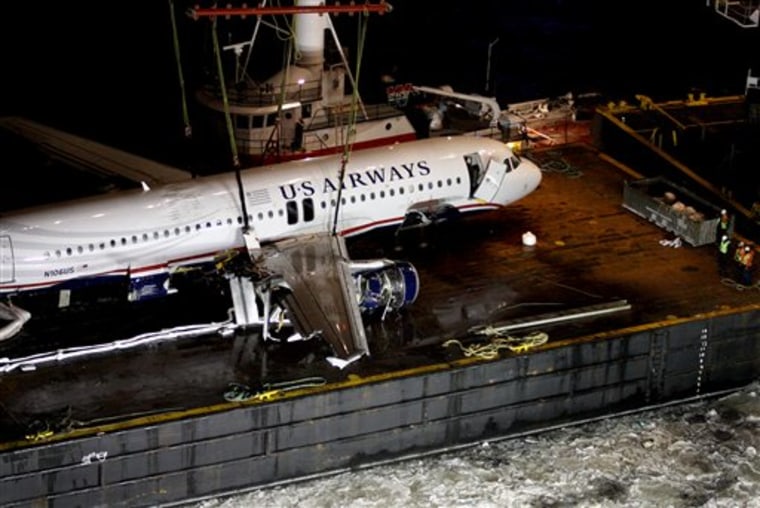The Federal Aviation Administration is proposing to keep secret from travelers its vast records on where and how often commercial planes are damaged by hitting flying birds.
The government agency argued that some carriers and airports would stop reporting incidents for fear the public would misinterpret the data and hold it against them. The reporting is voluntary because the FAA rejected a National Transportation Safety Board recommendation 10 years ago to make it mandatory.
The agency's formal secrecy proposal came just after FAA officials said they were going to release the huge database to The Associated Press in response to a Freedom of Information Act request. The FAA's move to expand secrecy also comes as President Barack Obama is promising a more open government.
"To have the government actually chill public access to safety information is a step backward," said James Hall, former chairman of the National Transportation Safety Board. "Public awareness is an essential part of any strong safety program."
Sen. Chuck Schumer and fellow New York Democrat, Rep. John Hall, vice chairman of the House aviation subcommittee, wrote administration officials urging them to abandon the proposal.
"There's no reason to make ... the causes of other accidents public and not this," Schumer said Friday.
"Whether the public should worry is for the public to decide, not FAA," said Rep. Brad Miller, D-N.C.
Sen. Jay Rockefeller. D-W.Va, chairman of the Senate Commerce, Science and Transportation Committee, advised the FAA he would review any change to ensure travelers and local communities have enough information "to make informed decisions regarding wildlife strikes on aircraft."
After a multiple bird strike forced a US Airways jet to ditch in the Hudson River on Jan. 15, the AP requested access to the bird strike database, which contains more than 100,000 reports of strikes that have been voluntarily submitted since 1990.
In a Feb. 18 conference call, FAA officials promised the AP the agency would turn over the data within days. Since then, the FAA has said the AP's request for the data under the Freedom of Information Act was "under review."
Last Thursday, the FAA quietly published its proposal to keep the data secret in the Federal Register, the government's daily compendium of new and proposed rules and regulations. On Wednesday, after the FAA proposal, Melanie Yohe of the FAA FOIA office told AP that release of the database was "way overdue" and "it should be with you right now." She said there is "no reason for it to take this long."
The agency's proposal rested on the assumption that some carriers and airports it regulates would allow concerns about their image and profits to override efforts to keep passengers safe.
"The agency is concerned that there is a serious potential that information related to bird strikes will not be submitted because of fear that the disclosure of raw data could unfairly cast unfounded aspersions on the submitter," the FAA wrote.
The FAA is worried the public will compare the data on various airports. "Drawing comparisons between airports is difficult because of the unevenness of reporting," it said. Not only do some airports do better reporting than others, they also face different challenges based on local bird populations, the agency said.
"Inaccurate portrayals of airports and airlines could have a negative impact on their participation in reporting bird strikes," FAA added.
'Secrecy is going to kill'
"It sounds like the FAA is going back to their early 1990s view that their job is to promote the carriers and look out for their bottom line," said Mary Schiavo, former Transportation Department inspector general. "They were criticized for that and then said they also were concerned with safety, but this sounds like they're reverting to being cheerleaders for the industry."
"In this case, secrecy is going to kill," added Schiavo, a pilot herself. Since the US Airways incident, businessmen who have had corporate jets damaged by strikes have told Schiavo they want to research the problem; she said the FAA's proposal would hamper that.
The Airports Council International-North America, which represents most U.S. airports, was consulting its members on how to respond to the FAA proposal.
The FAA has rejected another method of dealing with the problem of unequal reporting by airports and airlines.
In 1999, the National Transportation Safety Board concluded voluntary reporting omits many bird strikes so the FAA database "grossly underestimates the magnitude of the problem." Further, the board said "over 50 percent of the reports lack the most critical piece of information about a strike, the species of bird."
As a result, the board recommended that the FAA require that bird strikes be reported. The FAA refused.
Meantime, the FAA acknowledges the problem is growing along with increases in air travel and in the number of dangerous large birds like Canada geese. It said reports of strikes grew from 1,759 in 1990 to 7,666 in 2007.
FAA officials say the loss of both of a jetliner's engines to bird strikes is rare. FAA safety rules do not require that engines continue to produce thrust after a bird strike, only that they not break into pieces if hit by an eight-pound-or-smaller bird.
Two years ago, Richard A. Dolbeer, chairman of the Bird Strike Committee USA, a voluntary group of government officials and industry executives, wrote the safety board about four incidents in 2005-2007 in which both engines of an airliner were damaged — by yellow-legged gulls in Rome, canvasback ducks in Chicago, starlings in Washington, D.C., and doves in Ohio. In a 2005 incident, a Falcon 20 freight aircraft ingested mourning doves into both engines, lost all power, slid through an airport security fence in Ohio and across a highway into a corn field.
Dolbeer said the incidents "show the margins between safety and catastrophe are becoming rather thin."
